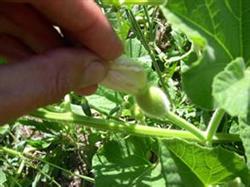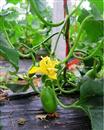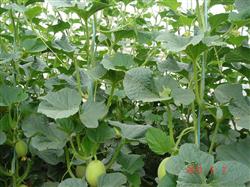Fertilizer requirements of muskmelon

According to the experiment, the optimum amount of nitrogen, phosphorus and potassium per plant is 612g, 1218g and 20g, respectively. Considering the loss of fertilizer and the actual fertilizer utilization rate of muskmelon, the amount of fertilizer applied per plant is about 12 grams of nitrogen, 25 grams of phosphorus and 20 grams of potassium, that is to say, for every 1000 kilograms of muskmelon, it is necessary to absorb 2.5 ~ 3.5kg of pure nitrogen, 1.3 ~ 1.7kg of phosphorus pentoxide and 4.4 ~ 6.8kg of potassium oxide from the soil. The soil fertility of each melon land is different, and how much fertilizer should be added on the basis of the original soil fertility needs to be determined. This is not easy to achieve in the actual production, in addition, there is a great disparity in the fertility of farm manure which is mainly used in production, and it is difficult to work out the accurate amount of fertilizer application. Therefore, in production, the amount of soil and miscellaneous fertilizer is usually 4000-5000 kg per 667 square meters, which is basically feasible. When applying chemical fertilizer, attention should be paid to the comprehensive application and reasonable collocation of nitrogen, phosphorus and potassium. The soils of high-quality thick-skinned melons such as Hami melon and Bailan melon and Gansu are mostly sandy and mild secondary saline-alkali soil. these mild secondary sandy soils are particularly rich in potassium, which is conducive to the improvement of melon quality. In addition to nitrogen, phosphorus and potassium, muskmelon is sensitive to calcium, magnesium, boron and other elements. Therefore, the soil rich in calcium can enhance the sweetness of the fruit. The soil contains a certain amount of salt, which can promote growth, mature earlier and increase sugar content. Muskmelon is a chlorine taboo crop, chlorine-containing fertilizers, such as ammonium chloride, potassium chloride, etc., should not be applied. Muskmelon also has high salt tolerance and can grow normally as long as the salt content in the soil is less than 1.14%.
- Prev

Production and control of deformed fruit of muskmelon
The fruit setting rate of muskmelon cultivated in greenhouse and double film is not high, and the drop of flower and fruit is very serious. According to the survey, the shedding rate of some melons is as high as more than 70%, especially the shedding rate of thick-skinned melons, which not only affects the yield and quality, but also delays the time to market and reduces the efficiency. The reason is, first, the application of base fertilizer is too much.
- Next

The reasons and overcoming measures of muskmelon not bearing melon
1. Promoting flower and protecting fruit: spraying Zhuangguatiling solution once in the early flowering stage, young fruit stage and fruit expansion stage can thicken the melon stalk, strengthen the directional transport of nutrients, promote the rapid development of melon body, beautiful melon shape and juicy taste; the growth cycle does not fall flowers, no falling melon, no crack melon, no deformed melon, at the same time, strengthen the field fertilizer and water.
Related
- Moge, come on! The staff of the peasant association in the producing area of cantaloupe were frightened when the crowd gathered.
- Causes and Solutions of low Fruit setting rate of Apple
- Symptoms and control measures of passion fruit virus disease
- Fruit growing lesson: how do apple orchards keep high yields?
- Can you build orchards in the mountains? What are the pros and cons?
- How to manage the coloring period of Crisson grape?
- This paper introduces the processing technology of two kinds of fig products.
- How much is a month for retired teachers in rural areas by 2020?
- How can strawberry planting increase sugar content? We should pay attention to management in many aspects.
- What are the cultivation techniques on how to improve the yield of golden fruit?

